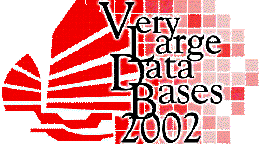- VLDB 2002
- 28th International Conference on
- Very Large Data Bases
- Kowloon Shangri-La Hotel
- August 20-23, 2002
- Hong Kong, China

|
|
||
|
|
||||||
|
|
||||||
|
KEYNOTE 1: TUESDAY, 20 AUGUST 2002, 09:15-10:30 |
||||||
|
(PDF
Presentation
Slides
- 88K) Adam
Bosworth
What is going to be
as important in the next 20 years as relational
databases were in the prior 20 years is the
management of self-describing extensible messages.
The net is undergoing a profound change as it moves
from an entirely pull-oriented model into a push
model. This latter model is far more biological in
nature with an increasing amount of information
flowing asynchronously through the system to form
an InformationBus. The key challenges for the next
20 years will be storing, routing, querying,
filtering, managing, and interacting with this bus
in a manner that doesn't lead to total systems
degradation. Predictive intelligent filtering and
rules engines will become more important than
querying. Driving factors for
this revolution will be the need for push for
portable devices due to their poor latency and
intermittent communication, an increasing demand
for timely information on fully connected devices,
a huge rise in application to application
integration through asynchronous messaging based on
web services and a concomitant requirement for an
entirely new type of message broker, and an
increasing desire for intelligent agents to cope
with information overload as all information
becomes available all the time. The key enabling
technology will be XML messages and the various
technologies that will develop for handling XML
ranging from transformation to compression to
indexing to storage to programming
languages.
As VP of
Engineering for BEA's Framework Division, Adam
drives the strategic and technical directions for
BEA's WebLogic Workshop, WebLogic Integration, and
WebLogic Portal products. Before joining BEA, Adam
co-founded Crossgain, a software development firm
acquired by BEA in 2001. Adam is widely recognized
as a pioneer and key figure in the evolution of
XML. Prior to Crossgain, Adam was a senior manager
at Microsoft where he drove the company's entire
XML program from 1997 through 1999. He was then
named general manager of Microsoft's WebData
organization, a team focused on refining the
company's long-term XML strategy. While at
Microsoft, he was also responsible for designing
and delivering the Microsoft Access PC Database
product, and he managed the development of the HTML
engine used in Internet Explorer 4 and Internet
Explorer 5.
|
||||||
|
KEYNOTE 2: WEDNESDAY, 21 AUGUST 2002, 09:00-10:30 |
||||||
|
||||||